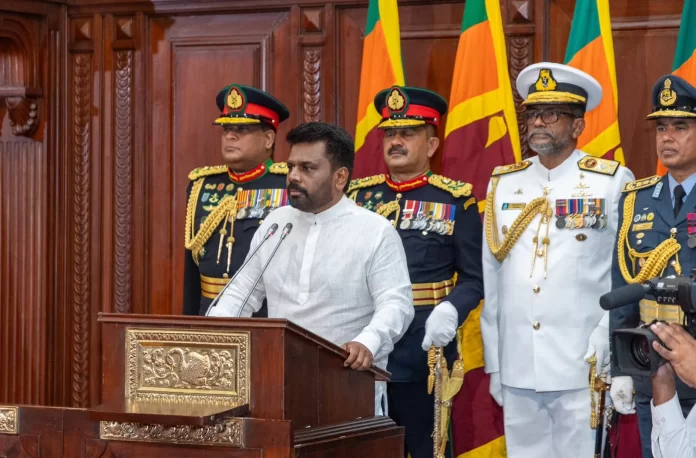GG News Bureau
New Delhi, 27th Sept. The recent victory of Marxist leader Anura Kumara Dissanayake and his party, Janatha Vimukthi Peramuna (JVP), in Sri Lanka signals a significant political shift. Dissanayake, the newly elected President, is not new to politics and has shown an active interest in strengthening India-Sri Lanka relations. Following his February visit to India, Dissanayake praised India for its support during Sri Lanka’s economic crisis, particularly in providing essential food and medical supplies.

During his election campaign, Dissanayake emphasized that Sri Lankan land, air, and sea would not be used against India’s security interests. This assurance contrasts with previous right-wing governments in Colombo, which tilted towards China in exchange for significant infrastructure investments. These investments came at a heavy price, as Sri Lanka fell into a debt trap that devastated its economy and endangered India’s strategic interests in the region.
India now faces a more complex challenge. While Dissanayake has assured that Sri Lanka will not act against India’s security concerns, the rise of a Marxist-aligned party in power raises uncertainties. Historically, Marxist ideologies have often leaned towards socialist alliances, which may include China, creating apprehensions for India despite diplomatic reassurances.
This development demands a careful recalibration of India’s foreign policy towards Sri Lanka. The potential for Chinese influence under a Marxist government cannot be overlooked, especially as both nations continue to compete for influence in the Indian Ocean region. With China’s infrastructure ambitions in Sri Lanka posing a serious security threat, India must navigate this new political landscape with caution.
While Dissanayake’s statements aim to soothe Indian concerns, the larger geopolitical dynamics—especially Sri Lanka’s history of debt diplomacy with China—leave India with legitimate reasons for apprehension. The coming months will reveal how Colombo balances its ties with both regional powers, and how New Delhi responds to a Sri Lanka now governed by Marxists, a significant shift from its earlier right-leaning governments.
The post Sri Lanka’s Shift to Marxist Leadership Raises Concerns for India appeared first on Global Governance News- Asia's First Bilingual News portal for Global News and Updates.




